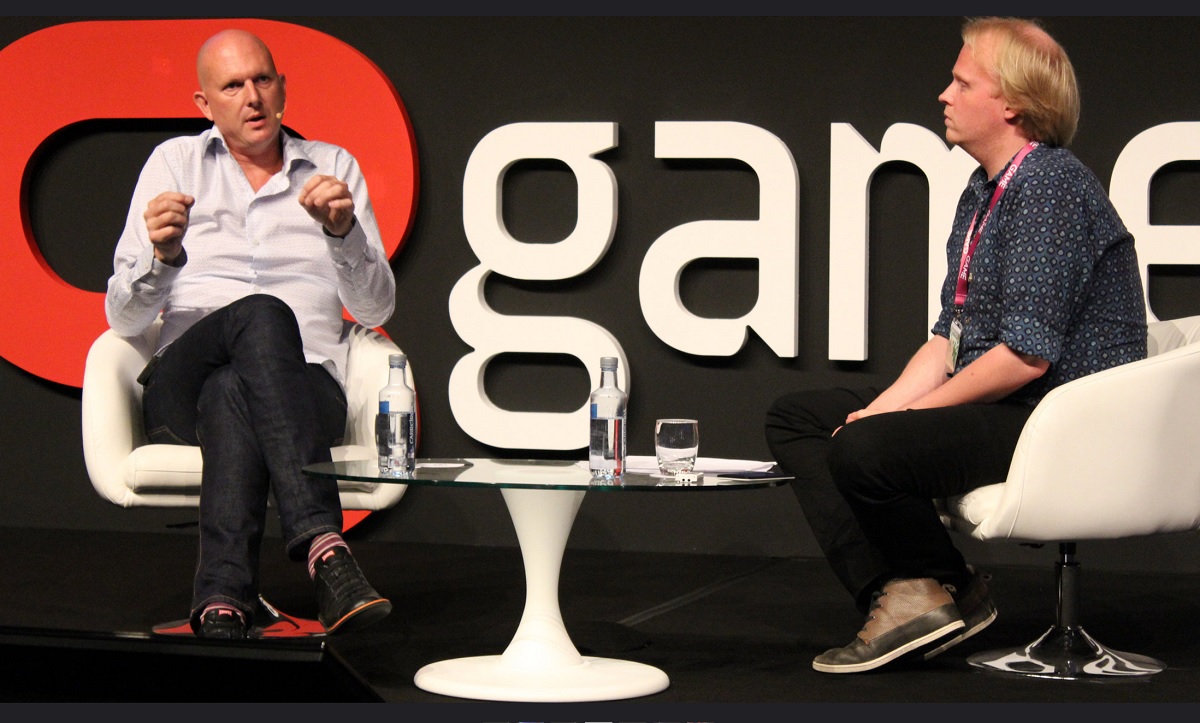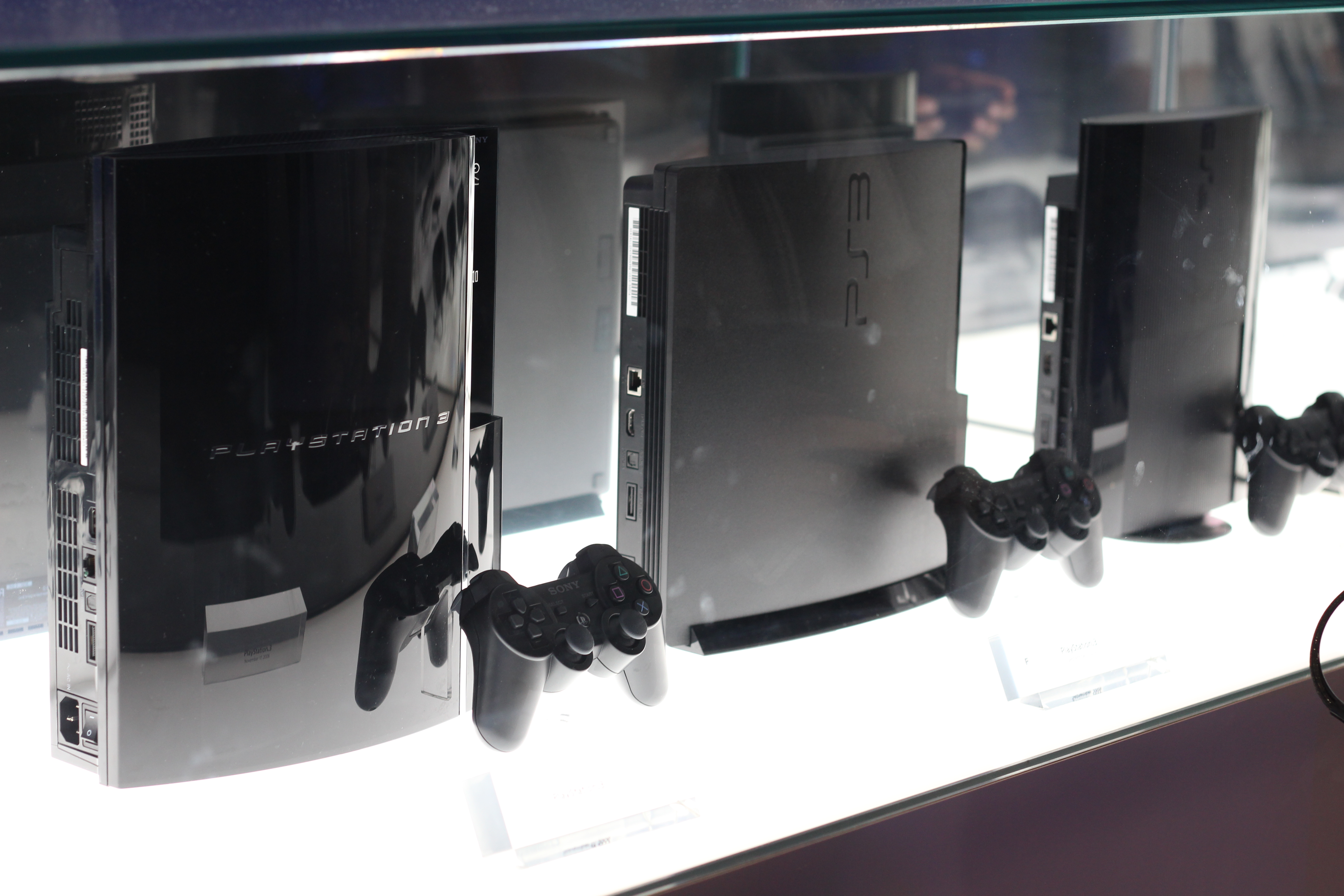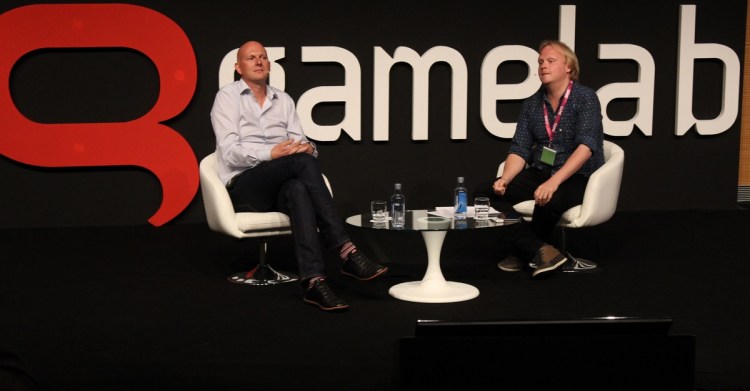testsetset
Phil Harrison was probably the tallest person at the Gamelab gaming event in Barcelona, Spain, this week. And that, along with his decades of gaming experience, gives him a great view into the past and the future of games.
Harrison ran research and development and first party worldwide studios for Sony’s PlayStation business. He left that position in 2008, and he began investing in game companies via London Venture Partners. In 2012, he became a corporate executive at Microsoft’s Xbox business, and he left that position in April 2015. At that point, he formed Alloy Platform Industries and became an investor in tech and games startups. Last week, he invested in Dream Reality, a maker of virtual reality experiences.
Harrison has a long view of games, and he’s optimistic about the opportunities in startups in VR. He did a fireside chat onstage with Matt Handrahan of GamesIndustry.biz at Gamelab. And I interviewed him one-on-one afterward. We talked about his view of the console wars, the positioning of the big platform companies, where games are headed, and investing as well.
Here’s an edited transcript of our interview.

Above: Phil Harrison (left) of Alloy Platform Industries and Matt Handrahan of GamesIndustry.biz
GamesBeat: How are you enjoying being outside of a console company?
Phil Harrison: I’m really enjoying being plural. I think that’s the description. It’s nice to be not tied to one particular thing. I can be helpful or useful, hopefully. And not exclusively in games. I’m invested in everything from games to stem cells and biotech.
GamesBeat: What does it take to be insightful about investing?
Harrison: If I knew that — well, it’s about the team. To focus on the announcement we made today, about Dream Reality Interactive, the reason I invested primarily in DRI is exactly the same reasons I invested in Supercell. It’s about the team, having a great team that understand their tool chain and their timing in the market. If you can get those Ts lined up, you have some percentage greater chance of success.
GamesBeat: And this is for a VR experience? They’re not exactly calling it a game.
Harrison: They are a team with incredible game chops. They’ve been a very experienced team working on the cutting edge of game development, and specifically VR, at Sony. But they’ve established a company with a view to taking that to the next level. VR is the entry point. It’s the appetizer, and then AR is going to be the main course, but it’ll take a bit of time. We’re making sure the team is set up correctly to take advantage of the timing.
GamesBeat: From the sidelines, where do you see the big three here and how well they’re doing?
Harrison: Nintendo has surprised me in a good way. They’ve put some excitement back in, or at least added a dynamic to the console equation that wasn’t there previously. From my focus group of a household with younger children, Switch is definitely the console that gets used. Mainly because of the content types. Surprisingly, the TV-to-mobile use case works way more effectively than I expected. Maybe I should give Nintendo more credit. I really enjoy that.

Above: The PlayStation 3 and both of the PS3 revisions.
GamesBeat: That seems to be what they tried to do with the Wii U, but it didn’t take. It may have been too early. The tethered tablet may have been a real problem.
Harrison: The tablet mode on Wii U just wasn’t powerful enough. It was rendered as a single frame from the console sent wirelessly from the console to the device. The Switch combined both modes into one and just switched the power state. When you’re tethered you get access to more wattage on the CPU and GPU. Maybe that technology didn’t exist when they were developing the Wii U. I suspect not. A great idea is about timing as much as it is about technology.
The game pipeline they have coming through looks pretty strong, with the greatest hits from Nintendo coming down the pipe in the next 12 months. That puts them in a strong decision.
GamesBeat: Between Sony and Microsoft, does it surprise you that Sony came ahead almost two to one on console units?
Harrison: The thing Sony has done incredibly well over many years is build up a very powerful distribution network outside of the U.S. and the U.K. I don’t think people truly understand how powerful that is and how much effort it’s taken. That’s part of it. But I also think Sony was just very clear about their proposition. It’s a powerful game console, no ambiguity. That’s what they tried to sell. Microsoft had a more challenged message at the beginning. They’ve acknowledged that themselves. But I think Microsoft has made a fantastic recovery. It’s still to play for.
GamesBeat: It must be very different to be in your position now. What were the last decisions you were involved in as far as the console business?
Harrison: It does make me laugh that there are even games I was involved in at Sony that have only just come out. That shows you how long these things have gone on for.
GamesBeat: The Last Guardian?
Harrison: I’m not saying. I’m not saying a word. But no, I love the industry and I love what’s going on in the space, so I’m really happy to see all of the companies doing well.

Above: Virtual reality will eventually be hot.
GamesBeat: Now that you’re in a neutral position, do you see mobile as a place where startups can make the biggest difference?
Harrison: It is. Even with all of the challenges of audience acquisition and barriers to entry — the development barrier to entry is really low, but distribution, awareness, cutting through the noise is really hard. Even with all those challenges, I still think mobile is the place to go. To make a console game as an indie, unless you have a sugar daddy relationship with the platform holder effectively sponsoring you, it’s really hard to make money.
GamesBeat: I notice some companies taking interesting pivots on VR now. Playful started with Lucky’s Tale on Oculus as an exclusive, but now they’re taking that same IP to Microsoft as a platform game for 2D screens. It’s a second use of the IP that might wind up being bigger as a market opportunity for them than the VR project.
Harrison: I played Lucky’s Tale a long time ago. I always was impressed with the style and design, but it felt like a 2D/3D platformer trying to be — maybe it’s come back to where it should be. I don’t know. I’m not in any way criticizing the game. I think they’ve done a great job.
That kind of pivot is a necessity in some cases. Not being specific to that game, but I think there are a lot of developers who have bet on consumer adoption of VR being bigger than it currently is. We’re definitely in the pre-inflection point of the hockey stick. We’re in the valley before we take off in the rocket ship.
GamesBeat: But you don’t doubt that will happen?
Harrison: Many factors will affect success, but no, I think there ultimately will be success. If you look at the weight of the balance sheet of Microsoft, Google, Sony, Apple on AR rather than VR, Samsung, and others who are all bringing their technology and, crucially, their supply chain efficiencies to this, I think we’re going to see a lot of growth. But we’re at the equivalent of the pre-iPhone moment in mobile.
GamesBeat: When you look at the larger games business and you add in these other platforms, what do you like about the deck these guys have to play with? You have Sony, Microsoft, and Nintendo, but you also have Google, Amazon, and Apple. There are interesting competitions among all these companies.
Harrison: You’re betting on five watts versus 160 watts. Are you going console, PC, hardcore, or are you going mobile, free-to-play? It doesn’t seem like there have been breakout hits in free-to-play on console yet, maybe because the top of the funnel isn’t big enough to support all of the customer acquisition. But that will happen.
I’m excited about the future. I’m enormously bullish about the future of games, mainly because now we don’t have to explain what this is anymore. There’s an understanding of games among the wider population.

Above: The new Xbox One X
GamesBeat: Among those big companies, do you feel like anyone has the most interesting strategy to capitalize on that?
Harrison: They all have tremendous positives and some small challenges. If Microsoft’s Xbox business was a stand-alone business, only focused on games, that would be an incredible business. When you look at it as a part of Microsoft spitting out $20 billion in free cash flow every year, it just shows up as a tiny little dot, which is always a deep frustration for the leadership in the Xbox business. They do an incredible job, but they don’t show up that often on the scorecard.
GamesBeat: Did you feel that inside both Sony and Microsoft?
Harrison: It’s a different pressure that Sony has. They have a much smaller balance sheet. They’re a much more focused company through necessity, through the challenges they’ve been through, which have been public over the last 10 years or so. It’s a good question. Which would you rather be: a focused company with a smaller balance sheet or an unfocused company with a very large balance sheet? Ultimately a strong balance sheet is a good thing to have, which is why a company like Amazon could end up being a disruptive force in games. They have AWS as this secret provider of incredible services to so many games companies, which they’re monetizing like crazy.
GamesBeat: I like to think of them as the intentional game platforms versus the unintentional game platforms.
Harrison: Right. I think Amazon knows they have a games business. It’s interesting that the games bit of Amazon reports in to the AWS leadership. That’s not a surprise or an accident. That’s very purposeful.
The one unknown, unseen is what Apple is really doing in AR and VR. I don’t believe for an instant that what they showed at the worldwide developer conference is all they’re doing in AR. But they made a very strong statement of intent, and that’s exciting for the future.
Disclosure: The organizers of Gamelab paid my way to Barcelona. Our coverage remains objective.

